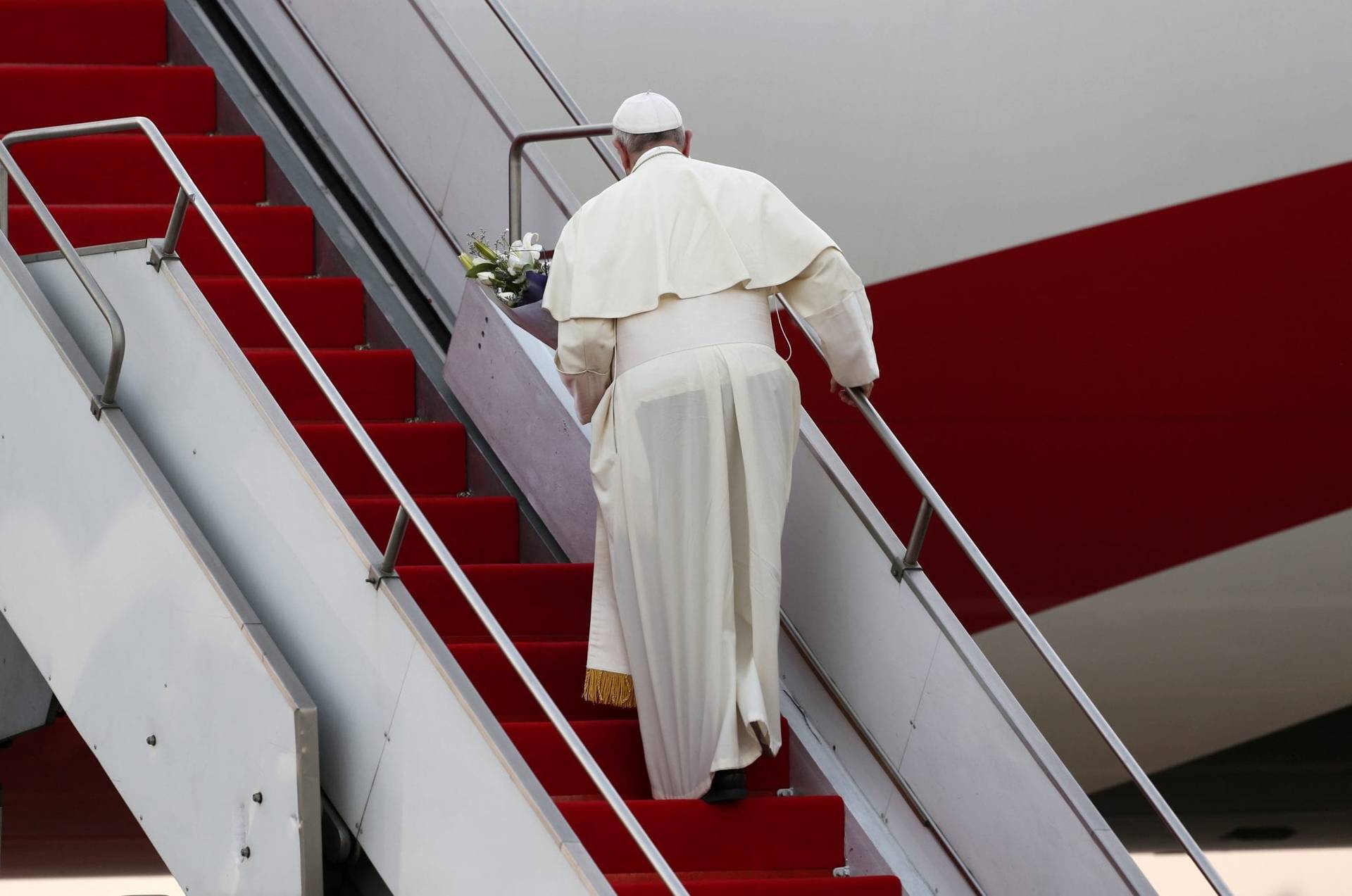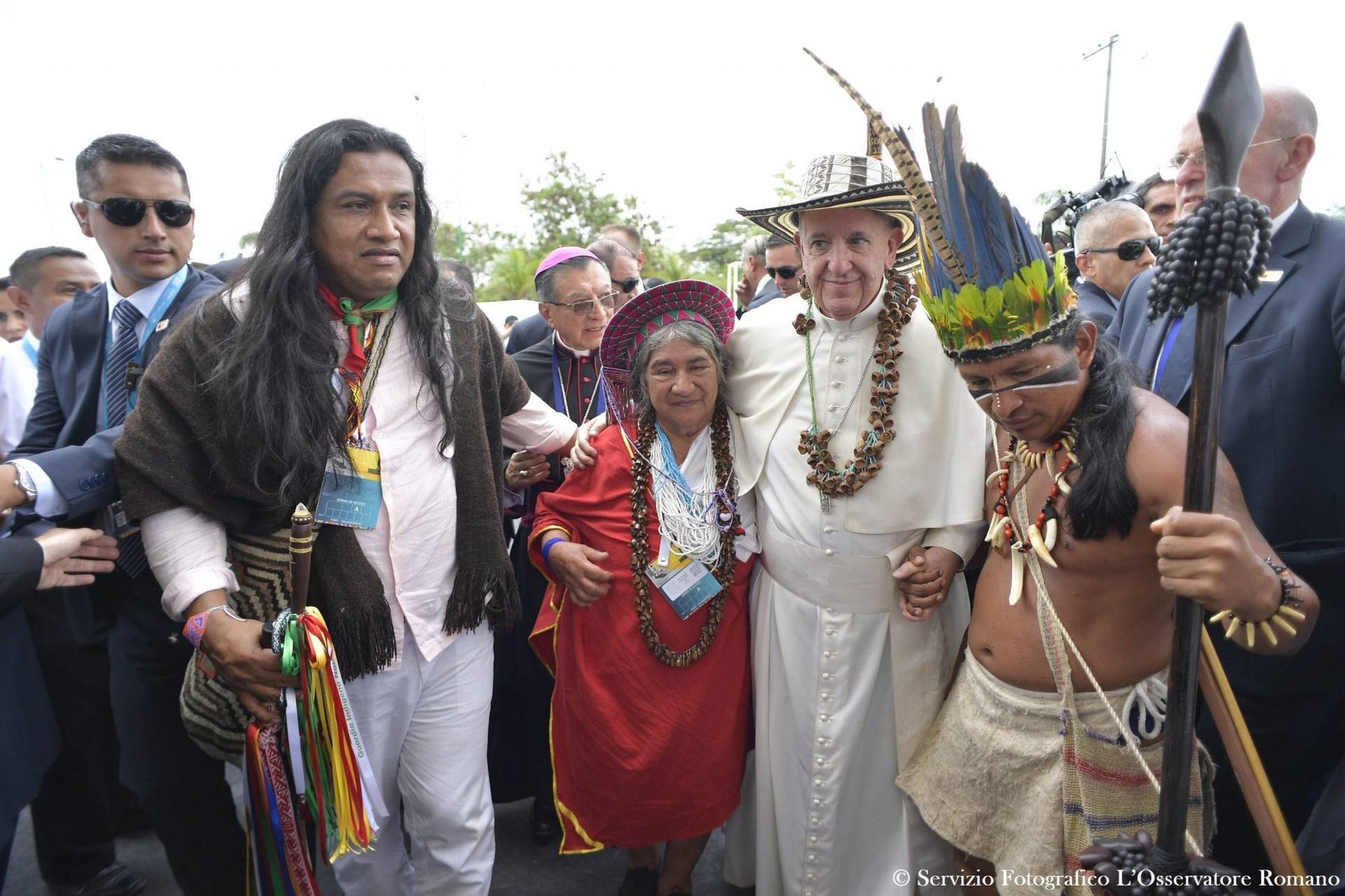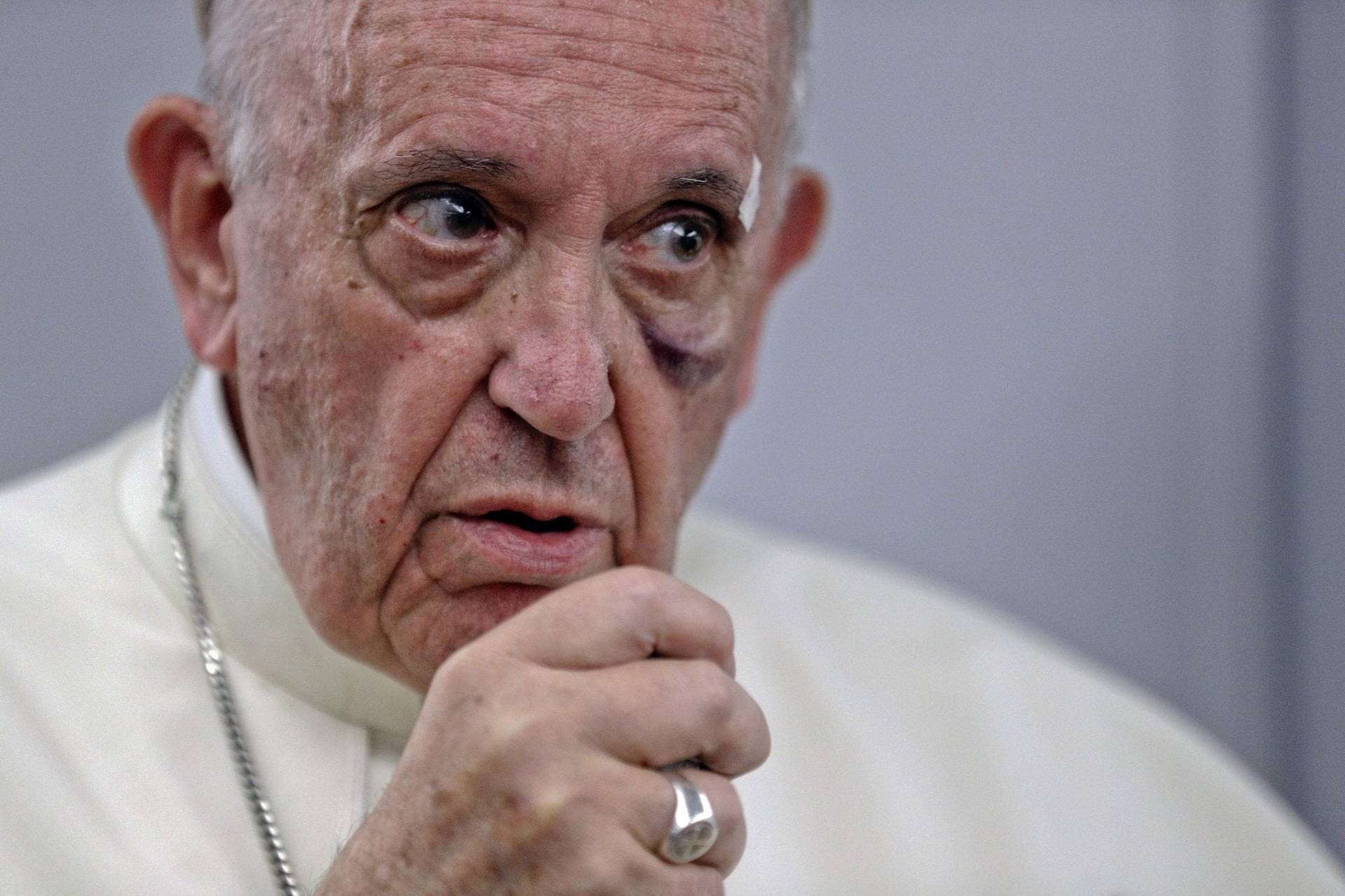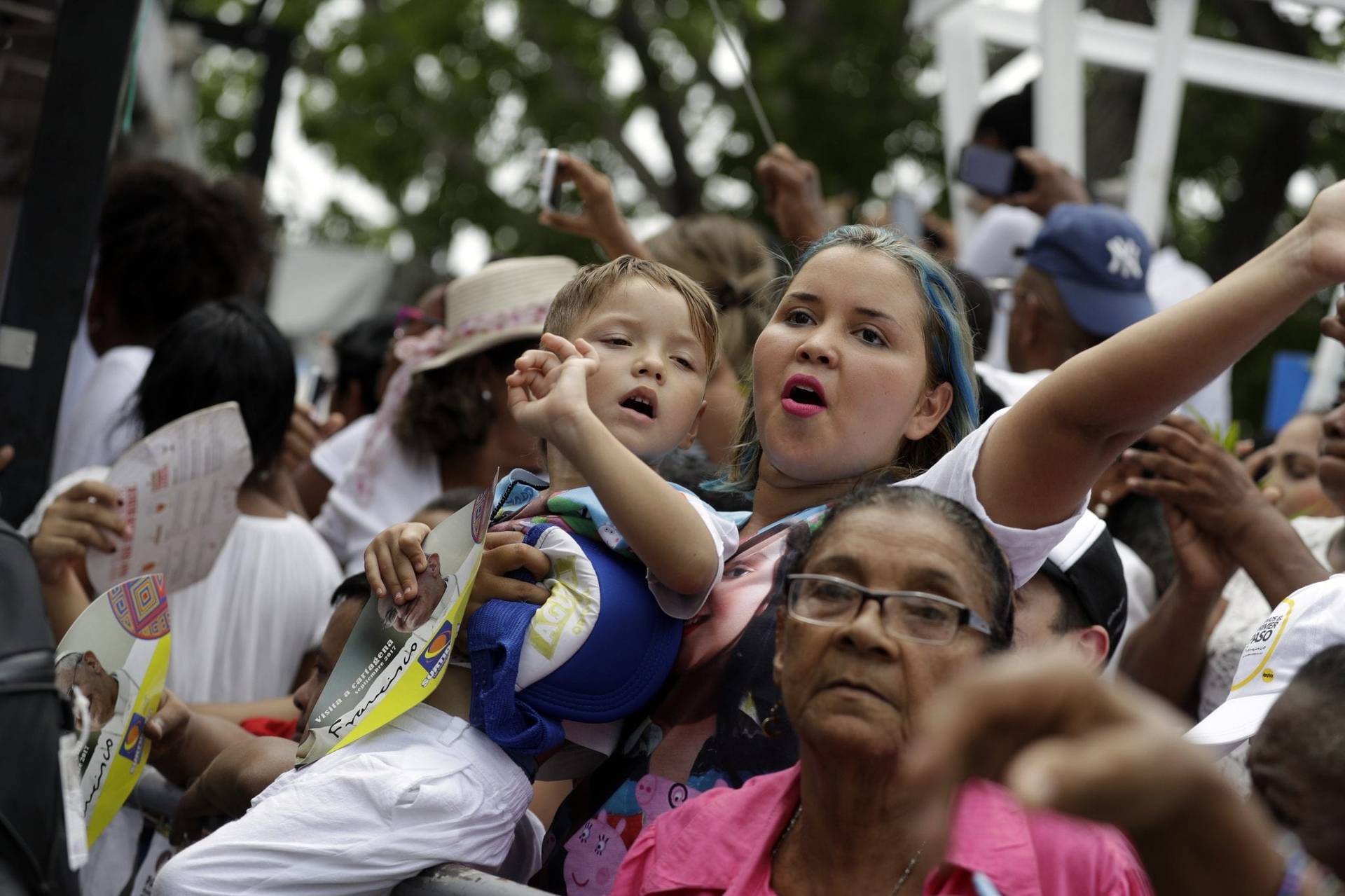BOGOTÁ, Colombia — On his way to Colombia for a Sept. 6-11 visit, Pope Francis asked for prayers for neighboring Venezuela, so the country currently gripped by both political and economic crises can find “beautiful stability.”
The Venezuela question has been looming over Francis’s fifth trip to Latin America since it was announced earlier in the year. Members of the Venezuelan bishops’ conference will be in Colombia, and announced via Twitter on Wednesday that they will have a private session with the Latin American pontiff on Sept. 7, Thursday, in the Colombian capital.
However, Vatican spokespersons underlined that it will be more of a meet-and-greet than a business meeting.
Vatican spokesman Greg Burke told journalists travelling with the pope on Wednesday that the Colombian bishops’ conference invited the bishops’ conferences of neighboring countries to the Mass in Bogotá, and alongside other dignitaries, Francis will be greeting a delegation from the Venezuelan bishops’ after the Mass in the sacristy.
It will be a personal, private, off-camera greeting, Burke said, which will take place after a Mass held in Bogotá’s Simon Bolivar Park expected to draw 700,000 people.
“In our encounter with the pope we will express the appreciation of the Venezuelan people towards the successor of Peter. In addition, we will ask for his support in the fight for human rights in Venezuela,” Cardinal Urosa Sabino of Caracas, the Venezuelan capital, in exclusive comments to Crux.
At the beginning of the flight from Rome to Bogotá, the Colombian capital, Francis, as is his custom, greeted journalists travelling with him and asked them to pray for the trip.
“I’d like to say that on this flight, we will fly over Venezuela,” Francis said, in the official version of his remarks released by the Vatican later on Wednesday.
“Therefore, [I suggest] a prayer also for Venezuela, so that it may have dialogue and the country will find a beautiful stability, through dialogue with all,” the pope said.
Among those greeting the pope after the Mass on Thursday will be Urosa of Caracas. On Tuesday, after celebrating Mass in the parish Christ the King in Bogota, during which he asked for peace in Venezuela, the cardinal told the faithful that the meeting with the pope was happening, and that it would be after the open-air Mass.
Francis will also encounter the Latin American bishops, including those from Venezuela, earlier in the day, but the Mass is the last event of the day, arguably giving the pontiff more time for personally greeting the prelates.
After the Mass, the pope is scheduled to travel in a closed car back to the Apostolic Nunciature, the house of the papal representative in Colombia where he will be staying throughout the trip. Here, a group of children, elderly and people with disabilities will be waiting for him.
Urosa told ACI Prensa that during the meeting, the bishops will first and foremost manifest “the affection” of the Venezuelan people to the successor of Peter, because “one of the characteristics of the Catholicism of Venezuela, as in the rest of Latin America, is the love for the pope, as successor of Peter, as Vicar of Christ.”
The bishops will also thank the pope for the support he’s giving to the Venezuelan people “in these difficult circumstances we’re going through, and we will also manifest our uneasiness regarding some problems of the current situation,” Urosa said.
He described his country’s situation as “very serious, it is a situation of penury, anguish.”
The country is currently in great political turmoil, with shortage of food to the point of people starving to death, and there’s lack of basic medicines in local hospitals.
But in addition to all this, Urosa said, there’s a “situation of permanent agitation and anguish for the violation of the rights of many Venezuelans in various fields.”
In a message to El Nacional Web, Cardinal Baltazar Porras acknowledged that Venezuela is going through a moment of “great uncertainty,” but that said uncertainty “cannot paralyze us nor make us take a step back.
“Pope Francis is very clear and honest when he says: ‘If we undertake any difficult situation with funeral faces, we’ve already failed,’” he said.
Baltazar Porras also urged the Venezuelan people to overcome the challenges with courage and trust.
“We are the ones who have to overcome, with prudence and respect to those who think differently, the evils that have been sown in society,” he said. “It’s us who have to build a country, all of us.”
Due to Venezuela’s ongoing crisis, an estimated million people have crossed the border to Colombia in the last three years, as a direct result to the “Bolivarian revolution,” started by President Hugo Chavez and perpetuated by Maduro.
Though he’s not expected to speak about Venezuela again during his time in Colombia, at least until the flight back, when reporters might ask Francis about it, the ongoing crisis is expected to come up during his private meeting with President Juan Manuel Santos.
This was confirmed by Santos, who in recent days said that a reference to what’s going on in Venezuela will be “mandatory.”
“In Venezuela, we’re looking for a transition because they finished the democracy,” Santos said. He’s scheduled to meet with U.S. President Donald Trump to address Venezuela later in the month, as he visits the United States to participate in the United Nations General Assembly.
Late in August, after Trump floated the idea of a military solution to Venezuela, embattled authoritarian president Maduro asked Francis to “help us prevent Trump from sending troops.”
The Venezuelan leader then asked the Argentine-born pope to help “establish a respectful dialogue” between political rivals in Venezuela. Francis, through the Vatican’s diplomatic service, has tried to accomplish this, advocating for dialogue on several occasions.
However, Rome’s preconditions for dialogue, aligned with those of the Venezuelan bishops’ conference, include the freeing of political prisoners, holding national elections, and acknowledging the country’s humanitarian crisis, which would allow for the arrival of foreign aid.
Pope Francis has spoken about the situation in Venezuela in numerous opportunities, the flight from Colombia only being the latest. His right-hand man, Italian Cardinal Pietro Parolin, a former papal representative in the country, has often said elections are the only solution to the crisis.
The hierarchy of the Venezuelan bishops’ conference traveled to Rome last April, where they met privately with Pope Francis.
During this encounter, the prelates told the pontiff that there’s “no ideological conflict between left and right. There’s a battle between a government that has become a dictatorship serving its own interests and an entire people who want freedom and are searching desperately, at the risk of their own lives, for bread, medicine, security, work, elections, freedom and autonomous political power.”
At the time, Archbishop Diego Padrón, President of the Venezuelan Bishops’ Conference, said after the meeting that the pontiff had informed them they have his “full confidence.”
This was interpreted as a response to efforts by Socialist President Nicolas Maduro to pit the bishops, who have been sharply critical of his economic and political policies, against the pope.
“He told us that that he’s very close to us and very well informed about the situation of Venezuela, and very close to the suffering of the people,” Padrón said.
Speaking at a press conference on Aug. 22, Maduro also criticized Parolin, the Vatican’s secretary of state, and the local bishops.
“I cry for the true Christian spirit of the pope and believe in him,” Maduro said.
Maduro said. “Another thing is the Vatican and the Vatican’s Secretary of State. I will not talk about them. Another thing is the [Venezuelan] Bishops’ Conference, I will not talk about them. May the people, may Catholics judge them.”
Francis arrived in Colombia on Wednesday, and has a long day in Bogota on Thursday, where he’ll deliver five addresses, including one to civil authorities and a homily at the Mass.














